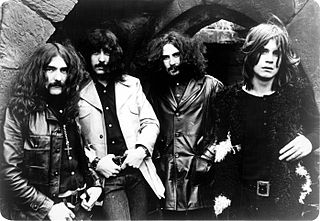
Black Sabbath were an English rock band formed in Birmingham in 1968 by guitarist Tony Iommi, drummer Bill Ward, bassist Geezer Butler, and vocalist Ozzy Osbourne. They are often cited as pioneers of heavy metal music. The band helped define the genre with their first three albums Black Sabbath, Paranoid, and Master of Reality (1971). Following Osbourne's departure in 1979, the band underwent multiple line-up changes, with Iommi being the only constant member throughout its history.
The Beatles Anthology is a multimedia retrospective project consisting of a television documentary, a three-volume set of double albums, and a book describing the history of the Beatles. Beatles members Paul McCartney, George Harrison and Ringo Starr participated in the making of the works, which are sometimes referred to collectively as the Anthology project, while John Lennon appears in archival interviews.

The Young Ones is a British sitcom written by Rik Mayall, Ben Elton, and Lise Mayer, starring Adrian Edmondson, Mayall, Nigel Planer, Christopher Ryan, and Alexei Sayle, and broadcast on BBC Two for two series, first shown in 1982 and 1984. The show focused on the lives of four dissimilar students and their landlord's family on different plots that often included anarchic, offbeat, surreal humour. The show often included slapstick gags, visual humour and surreal jokes sometimes acted out by puppets, with each episode also featuring a notable selection of guest stars and musical numbers from various performers.

Paranoid is the second studio album by English heavy metal band Black Sabbath, released on 18 September 1970, by Vertigo Records in the United Kingdom and on 7 January 1971, by Warner Bros. Records in the United States. The album contains several of the band's signature songs, including "Iron Man", "War Pigs" and the title track, which was the band's only Top 20 hit, reaching number 4 on the UK charts.

Nigel George Planer is a British actor, writer and musician. He played Neil in the BBC comedy The Young Ones and Ralph Filthy in Filthy Rich & Catflap. He has appeared in many West End musicals, including original casts of Evita, Chicago, We Will Rock You, Wicked, and Charlie and the Chocolate Factory. He has also appeared in Hairspray. He won a BRIT award in 1984 and has been nominated for Olivier, TMA, WhatsOnStage and BAFTA awards.

Sabotage is the sixth studio album by English rock band Black Sabbath, released on 28 July 1975. The album was recorded in the midst of a legal battle with the band's former manager, Patrick Meehan. The stress that resulted from the band's ongoing legal woes infiltrated the recording process, inspiring the album's title. It was co-produced by guitarist Tony Iommi and Mike Butcher.

Type O Negative was an American gothic metal/doom metal band formed in Brooklyn, New York City in 1989 by Peter Steele, Kenny Hickey, Josh Silver, and Sal Abruscato, who was later replaced by Johnny Kelly. Their lyrical emphasis on themes of romance, depression, and death resulted in the nickname "the Drab Four". The band went platinum with 1993's Bloody Kisses, and gold with 1996's October Rust, and gained a fanbase through seven studio albums, two best-of compilations, and concert DVDs.
David Lloyd Stewart is an English musician known for his work with the progressive rock bands Uriel, Egg, Khan, Hatfield and the North, National Health, and Bruford. Stewart is the author of two books on music theory and wrote a music column for KeyboardMagazine (USA) for thirteen years. He has also composed music for TV, film and radio, much of it for Victor Lewis-Smith's production company. He has worked with singer Barbara Gaskin since 1981.
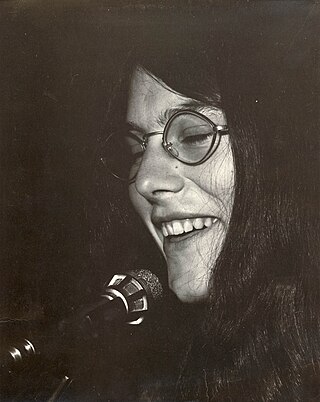
Barbara Gaskin is an English singer formerly associated with the UK Canterbury scene.
In the field of recorded music, a hidden track is a song or a piece of audio that has been placed on a CD, audio cassette, LP record, or other recorded medium, in such a way as to avoid detection by the casual listener. In some cases, the piece of music may simply have been left off the track listing, while in other cases, more elaborate methods are used. In rare cases, a 'hidden track' is actually the result of an error that occurred during the mastering stage production of the recorded media. However, since the rise of digital and streaming services such as iTunes and Spotify in the late 2000s and early 2010s, the inclusion of hidden tracks has declined on studio albums.
"Hole in My Shoe" is a song by English rock band Traffic featuring a spoken-word midsection by Chris Blackwell's stepdaughter, Francine Heimann, in which she tells a little story about a giant albatross. It was released as a single in 1967 and reached number 2 in the UK Singles Chart, number 22 in the German charts, and number 4 in Canada. Composed by guitarist Dave Mason, it was disliked by the other three members of the group who felt that it did not represent the band's musical or lyrical style.

Black Box: The Complete Original Black Sabbath 1970–1978 is a collection of the first eight albums by the heavy metal band and a DVD of 4 videos. The set contains the albums recorded with original singer Ozzy Osbourne, who was fired in 1979 after completion of the band's Never Say Die! tour. This marked the end of the group's original line-up that featured Osbourne, guitarist Tony Iommi, bassist Geezer Butler and drummer Bill Ward. All eight albums are digitally remastered and repackaged in mock vinyl LP packaging, including an 80-page booklet with liner notes written by Henry Rollins, Chris Welch, and Brian Ives. The discs included in the set are as follows:
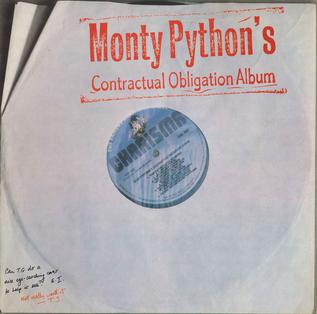
Monty Python's Contractual Obligation Album is the final studio album by Monty Python, released in 1980. As the title suggests, the album was put together to complete a contract with Charisma Records. Besides newly written songs and sketches, the sessions saw re-recordings of material that dated back to the 1960s pre-Python shows I'm Sorry, I'll Read That Again, The Frost Report, At Last The 1948 Show and How To Irritate People. One track, "Bells", dates from the sessions for Monty Python's Previous Record, while further material was adapted from Eric Idle's post-Python series Rutland Weekend Television. The group also reworked material written but discarded from early drafts of Life Of Brian, as well as the initial scripts for what would eventually become The Meaning Of Life.
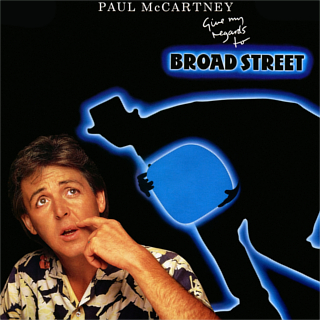
Give My Regards to Broad Street is the fifth solo studio album by Paul McCartney and the soundtrack to the film of the same name. It features covers of Beatles' songs, Wings and solo tracks by McCartney, as well as a few new songs. The album reached number 1 on the UK chart. The lead single, "No More Lonely Nights", was BAFTA and Golden Globe Award nominated. It was also to be his final album to be released under Columbia Records, which had been his US label for over five years.

The Bedsit Tapes is a compilation of songs recorded by the synthpop/new wave duo Soft Cell before their record contract with Some Bizzare Records. The album, released on 1 August 2005, collects various songs recorded in an amateur studio at Leeds Metropolitan University, then called Leeds Polytechnic, in Leeds. The album includes three tracks which appeared on their rare independent 1980 release, Mutant Moments. The album has received criticism for not being comprehensive enough, excluding several rare cuts which have appeared on previous bootlegs. David Ball, the keyboardist, comments on the album in the liner notes.
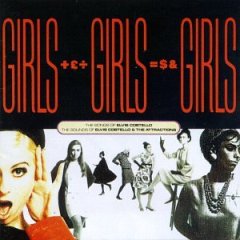
Girls Girls Girls is a 1989 compilation album collecting various previously released songs by British singer/songwriter Elvis Costello from 1977–86. Costello chose and ordered the tracks on the album himself, and accompanied them with extensive liner notes. The title of the album is sometimes rendered as Girls! Girls! Girls! orGirls +£÷ Girls =$& Girls.
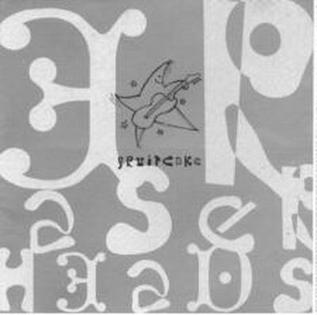
Fruitcake is the fourth studio album by the Philippine alternative rock band Eraserheads, released on December 6, 1996 by BMG Records (Pilipinas), Inc.

The Rutles is a soundtrack album to the 1978 telemovie All You Need Is Cash. The album contains 14 of the tongue-in-cheek pastiches of Beatles songs that were featured in the film.
This is a list of releases by The Bar-Steward Sons of Val Doonican, including studio and live albums, singles and other media.














